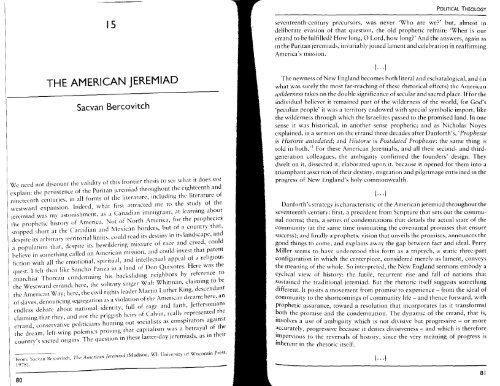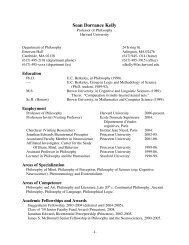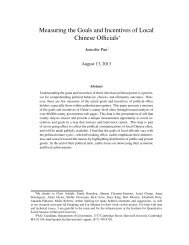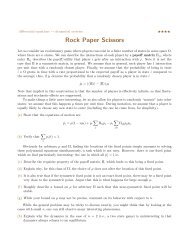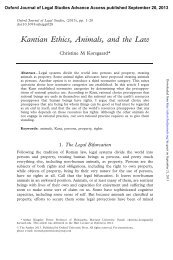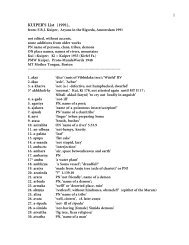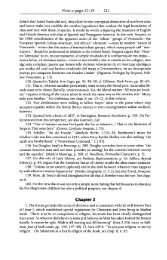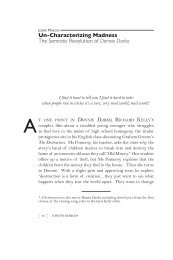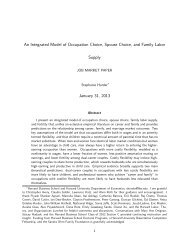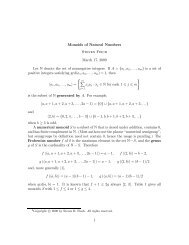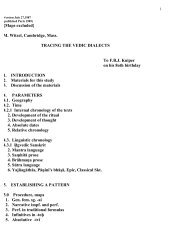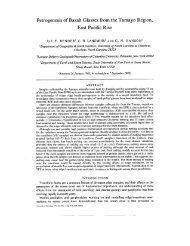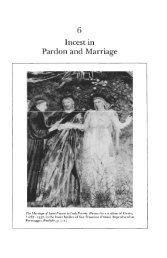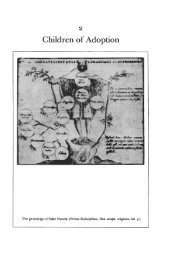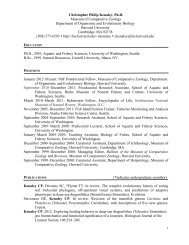THE AMERICAN JEREMIAD - People.fas.harvard.edu
THE AMERICAN JEREMIAD - People.fas.harvard.edu
THE AMERICAN JEREMIAD - People.fas.harvard.edu
Create successful ePaper yourself
Turn your PDF publications into a flip-book with our unique Google optimized e-Paper software.
15<br />
<strong>THE</strong> <strong>AMERICAN</strong> <strong>JEREMIAD</strong><br />
Sacvan Bercovitch<br />
We need not discount the validity of this frontier thesis to see what it does not<br />
explain: the persistence of the Puritan jeremiad throughout the eighteenth and<br />
nineteenth centuries, in all forms of the literature, including the literature of<br />
westward expansion. Indeed, what first attracted me to the study of the<br />
jeremiad was my astonishment, as a Canadian immigrant, at learning about<br />
the prophetic history of America. Not of North America, for the prophecies<br />
stopped short at the Canadian and Mexican borders, but of a country that,<br />
despire its arbirrary rerritoriallimits, could read its destiny in its landscape, and<br />
a population that, despite its bewildering mixture of race and creed, could<br />
believe in something called an American mission, and could invest that patent<br />
fiction with all the emotional, spiritu
SACVAN BERCOVITCH<br />
I am suggesting that 'the process of Americanization' began not with the<br />
decline of Puritanism but with the Great Migration, and that the jeremiad,<br />
accordingly, played a significant role in the development of what was to become<br />
modern middle-class American culture. I hope that in suggesting this I do not<br />
seem to be over-straining the worn links between Puritanism and the rise of<br />
capitalism. My point is simply that certain elements in Puritanism lent themselves<br />
powerfully to that conjunction, and precisely those elements came to the<br />
fore when the Bay emigrants severed their ties with the feudal forms of Old<br />
England and set up a relatively fluid society on the American strand - a society<br />
that devalued aristocracy, denounced beggary, and opened up political, <strong>edu</strong>cational,<br />
and commercial opportunities to a relatively broad spectrum of the<br />
population.<br />
I·· ·1<br />
These and many similar quantitative differences between Old and New<br />
England are symptomatic, I believe, of a sweeping qualitative distinction<br />
between America and all other modern countries. In England (and the Old<br />
World generally), capitalism was an economic system that evolved dialectically,<br />
through conflict with earlier and persistent ways of life and belief. Basically<br />
New England bypassed the conflict. This is by no means to say that conflict was<br />
avoided altogether. On the contrary: the first century of New England history is<br />
a remarkable instance of rapid social change, involving widespread moral,<br />
psychic, and political tensions. The emergent structures of a free-enterprise<br />
economy did not all at once transform the guild and craft mentality; for a time<br />
mercantile capitalism actually helped maintain aristocratic privilege; for an<br />
even longer time pre-modern modes of social and familial relationship resisted<br />
the commercial revolution underway in the Northern Anglo-American colonies.<br />
But by and large the resistance was as ineffectual as it was anachronistic. It<br />
signified not a contest between an established and an evolving system, but a<br />
troubled period of maturation. The emigrant leaders did not give up their class<br />
prerogatives when they landed at Massachusetts Bay, and yet the forms they<br />
instituted tended to erode traditional forms of deference. They restricted<br />
opportunity in commerce and property ownership, yet social power in the<br />
colony increasingly shifted to the commercial and property-owning classes. In<br />
all fundamental ideological aspects, New England was from the start an outpost<br />
of the modern world. It evolved from its own origins, as it were, into a middleclass<br />
culture - a commercially oriented economy buttressed by the decline of<br />
European feudalism, unhampered by lingering traditions of aristocracy and<br />
crown, and sustained by the prospect (if not always the fact) of personal<br />
advancement - a relatively homogeneous society whose enterprise was consecrated,<br />
according to its civic and clerical leadership, by a divine plan of<br />
progress.<br />
82<br />
[. 00]<br />
POLITICAL <strong>THE</strong>OLOGY<br />
The European jeremiad developed within a static hierarchical order; the<br />
lessons it taught, about historical recurrence and the vanity of human wishes,<br />
amounted to a massive ritual reinforcement of tradition. Its function was to<br />
make social practice conform to a completed and perfected social ideal. The<br />
American Puritan jeremiad was the ritual of a culture on an errand - which is<br />
to say, a culture based on a faith in process. Substituting teleology for<br />
hierarchy, it discarded the Old World ideal of stasis for a New World vision<br />
of the future. Its function was to create a climate of anxiety that helped release<br />
the restless 'progressivist' energies required for the success of the venture. The<br />
European jeremiad also thrived on anxiety, of course. Like all 'traditionalist'<br />
forms of ritual, it used fear and trembling to teach acceptance of fixed social<br />
norms. But the American Puritan jeremiad went much further. It made anxiety<br />
its end as well as its means. Crisis was the social norm it sought to inculcate.<br />
The very concept of errand, after all, implied a state of unfulfillment. The<br />
future, though divinely assured, was never quite there, and New England's<br />
Jeremiahs set out to provide the sense of insecurity that would ensure the<br />
outcome. Denouncing or affirming their vision fed on the distance between<br />
promise and fact.<br />
[00·1<br />
The Puritan jeremiad set out the sacred history of the New World; the eighteenth-century<br />
jeremiad established the typology of America's mission. That<br />
outlook, to be sure, had become almost explicit by the last decades of the<br />
seventeenth century. But the Puritans were careful to make Scripture the basis of<br />
their figuralism. They always rooted their exegeses (however strained) in<br />
biblical texts, and they appealed to (even as they departed from) a common<br />
tradition of Reformed hermeneutics. Because they believed the Reformation<br />
was reaching its fulfillment in America, and because they identified themselves<br />
primarily in religious terms, they found it necessary to include all the standard<br />
landmarks of Protestant historiography. Their Yankee heirs felt relatively free<br />
of such constraints. During the eighteenth century, the meaning of Protestant<br />
identity became increasingly vague; typology took on the hazy significance of<br />
metaphor, image, and symbol; what passed for the divine plan lost its strict<br />
grounding in Scripture; 'providence' itself was shaken loose from its religious<br />
framework to become part of the belief in human progress. The Yankee<br />
Jeremiahs took advantage of this movement 'from sacred to profane' to shift<br />
the focus of figural authority. In effect they incorporated Bible history into the<br />
American experience - they substituted a regional for a biblical past, consecrated<br />
the American present as a movement from promise to fulfillment, and<br />
translated fulfillment from its meaning within the closed system of sacred<br />
history into a metaphor for limitless secular improvement.<br />
All this was a matter of extension and adaptation, not of transformation. The<br />
Puritan clergy had set out to blur traditional distinctions between the world and<br />
the kingdom. Their rhetoric issued in a unique mode of am biguity that<br />
83
SACVAN BERCOVITCH<br />
precluded the heaven's time and man's. 'Canaan' was a spiritual state for them,<br />
as it was for other Christians; but it was also (in another, but not conflicting<br />
sense) their country. They spoke of the mutuality (rather than the coexistence)<br />
of fact and ideal. By 'church-state' they meant a separation of powers in the<br />
belief that in the American Canaan, and there only, the ecclesiastical and the<br />
civic order were not really distinct. By thcir own contradictions they lucre made<br />
to C01TCS!J01ld.<br />
I·· .j<br />
One important reason for the success of the Americln Revolution was that its<br />
advocltes h,ld inherited a figur'llmode of consensus that could endorse Lockean<br />
universalism and yet exclude from it whatever then hindered the progress of<br />
the republic. The /\merican was not (like the French citoy('11 or the Latin<br />
American ciudadLlIlo) a member of 'the people'. I Ie stood for an errand that<br />
was limitless in effect, because it was limited in fact to a 'peculiar' nation. Thus<br />
(in the notorious paradox of the Declaration of Independence) he could<br />
denounce servitude, oppression, ,md iludequate representation while concerning<br />
himself least (if at all) with the most enslaved, oppressed and inadequately<br />
represented groups in the land. Those groups were part of 'the people', perhaps,<br />
but not the chosen people; part of America, but not the AmeriCl of the<br />
Revolution. Through the ritual of the jeremiad, the leading patriots recast<br />
the Declar,ltion to read 'all propertied Anglo-Saxon Protestant m,lles are<br />
created equal'. Through that ritual, they bound 'lnd tamed the potential<br />
excesses of the early republic - on the one hand, the social demands of groups<br />
outside their middle-class consensus; on the other hand, the anarchy of unfettered<br />
sel f-interest. In short, they used the jeremi'ld to con fine the concept of<br />
revolution to American progress, AmericlIl progress to God's New Israel, and<br />
God's New Israel to people of their own kind. It is no accident th;lt the debate at<br />
the turn of the nineteenth century between the Federalists and the Jeffersonians<br />
turned on which party was the legitimate heir to the title of the American<br />
Israel. 2 Nor is it by accident that under Jefferson's administr,ltion the Revolution<br />
issued in an increasing violation - for blacks and Indians - of life, liberty,<br />
and the pursuit of happiness. Nor is it accidental, finally, that while France ,md<br />
Latin America degenerated into factional pandemoniums, the American republic<br />
generated a conformist spirit that foreign observers termed a 'tyranny of the<br />
majority'.<br />
Middle-dass majority would have been more precise. Nationalism has served<br />
elsewhere to unify modern communities, but always by recourse to secular<br />
continuities from the past. Even when the national ideal makes universal claims,<br />
its basis remains local, historical, and complex. European national heroes, for<br />
all their representative qualities, are circumscribed by class and genealogy; the<br />
messianic dreams of German and Russian nationalism are rooted in atavistic<br />
distinctions of race, religion, and geography. The 'American' community, on<br />
the contrary, defines itself by its relation to the Revolution and the promised<br />
84<br />
POLITICAL <strong>THE</strong>OLOGY<br />
future; or, more accurately, by a continuing revolution based on 'a conception<br />
ofthe future as the present'. Especially when its adherents invoke the legend of<br />
the fathers, as William Arthur does in his July Fourth oration, 'American'<br />
identity obviates the usual distinctions of national history - divisions of class,<br />
complexities of time and place - because the very meaning of 'American'<br />
involves a cultural, not a national, myth of consensus.' It is a testament to<br />
the power of this myth that our major nineteenth-century writers through<br />
Henry James could complain about the lack of history and diversity in the land.<br />
'I have never seen a nation so much alike in my life, as the people of the United<br />
States,' wrote Cooper in Notions of the Americans (1828). He knew well<br />
enough about Indians and blacks, about differences between the urban rich,<br />
emigrant laborers, and rural gentry, about the variety of customs in the North,<br />
South, and West. So, too, did Hawthorne when in 1860 he described the United<br />
States as 'a country where there is no '" antiquity, no mystery, no picturesque<br />
and gloomy wrong, nor anything but a commonplace prosperity, in broad and<br />
simple daylight.' It was not ignorance or insensitivity that led to these wry<br />
complaints. It was merely, astonishingly, that in terms of the myth which<br />
Cooper and Hawthorne shared, such differences did not count. Nation meant<br />
AmericLms for them, Americans meant the peotJle, and the people meant those<br />
who, thanks to the Revolution, enjoyed a common!)lace prosperity: the simple,<br />
sunny rewards of American middle-class culture.<br />
[...]<br />
Indeed, the very proliferation of dissidents and reformers - the endless<br />
debate during the Middle Period about the true meaning of America - served<br />
to confirm the norms of the culture. What higher defense could one offer for<br />
middle-class society than an American Way that sui generis evoked the free<br />
competition of ideas? - and what could make this freedom safer for society<br />
than to define it in terms of the American Way? ror by the logic of continuing<br />
revolution, any term blessed by the adjective American was a positive good;<br />
but by the same logic not everything in America was so blessed. Margaret<br />
Fuller could represent the American spirit to her supporters insofar as they<br />
denied that spirit to her no less representative antagonists. Both Henry Thoreau<br />
and William Arthur defined themselves as revolutionary Americans, but for<br />
each the definition entailed a rejection of the other. The state of tension that<br />
ensued proved an inexhaustible (because self-generating) source of exultation<br />
through lament. Under the slogan of continuing revolution, the ritual of the<br />
jeremiad spawned an astonishing variety of official or self-appointed committees<br />
on un-American activities: 'progressivist societies' for eradicating the<br />
Indians, 'benevolent societies' for deporting the blacks, 'Young Americans'<br />
for banning European culture, 'populists' obsessed with the spectre of foreign<br />
conspiracy, voluntary associations for safeguarding the Revolutionary tradition,<br />
male and female 'reform societies' for social regeneration through sexual<br />
purification.<br />
85
SACVAN BERCOVITCH<br />
In all cases, the ideal of American revolution ruled out any basic challenge to<br />
the system. In Europe and Latin America, the summons to 'the people', precisely<br />
because it was generalized and unbounded, exposed the pretense of unity; there,<br />
revolution bared the dialectics of historical change. In the United States, the<br />
summons to dissent, because it was grounded in a prescribed ritual form,<br />
preempted the threat of radical alternatives. Conflict itself was rendered a mode<br />
of control: a means of facilitating process through which process became an aid<br />
to socialization. Again, the plight of the mid-nineteenth-century feminists is<br />
instructive. On the one hand, it reminds us that the jeremiad has always<br />
restricted the ritual of consensus to a certain group within the culture. When<br />
William Arthur spoke of 'the American', he was not thinking of people like<br />
Margaret Fuller- or for that matter, of frederick Douglass, Black Hawk, Rabbi<br />
Issac Meyer Wise, or ./ohn England, the Catholic Bishop of Charleston, South<br />
Carolina. But on the other hand, the feminist struggle reminds us that such<br />
restrictions were largely a matter of what Plotinus Plinlimmon called 'virtuous<br />
expediency'. For the fact is that the American consensus could also absorb<br />
feminism, so long as that would lead into the middle-class American Way.<br />
Blacks and Indians too could learn to be True Americans, when in the fullness of<br />
time they would adopt the tenets of black and red capitalism. John Brown could<br />
join Adams, Franklin, and Jefferson in the pantheon of Revolutionary heroes<br />
when it was understood that he wanted to fulfill (rather than undermine) the<br />
American dream. On that provision, ./ews and even Catholics could eventually<br />
become sons and daughters of the American Revolution. On those grounds,<br />
even such unlikely candidates for perfection as Alaska, Hawaii, and Puerto Rico<br />
could become America.<br />
[· .. 1<br />
The ritual ofthe jeremiad bespeaks an ideological consensus- in moral, religious,<br />
economic, social, and intellectual matters - unmatched in any other modern<br />
culture. And the power ofconsensus is nowhere more evident than in the symbolic<br />
meaning that the jeremiads infused into the term America. Only in the United<br />
States has nationalism carried with it the Christian meaning of the sacred. Only<br />
America, of all national designations, has assumed the combined force of<br />
eschatology and chauvinism. Many other societies have defended the status<br />
quo by reference to religious values; many forms of nationalism have laid claim to<br />
a world-redeeming promise; many Christian sects have sought, in secret or open<br />
heresy, to find the sacred in the profane, and many European defenders of middleclass<br />
democracy have tried to link order and progress. But only the American<br />
Way, of all modern ideologies, has managed to circumvent the paradoxes<br />
inherent in these approaches. Of all symbols ofidentity, only America has united<br />
nationality and universality, civic and spiritual selfhood, secular and redemptive<br />
history, the country's past and paradise to be, in a single synthetic ideal.<br />
The symbol of America is the triumphant issue of early New England rhetoric<br />
and a long-ripened ritual of socialization.<br />
86<br />
POLITICAL <strong>THE</strong>OLOGY<br />
[...j<br />
The symbol took on an entirely di fferent function from that of the religious<br />
symbols in which it was rooted. The revelation of the sacred serves to diminish,<br />
and ultimately to deny, the values of secular society. The revelation of America<br />
serves to blight, and ultimately to preclude, the possibility of fundamental social<br />
change. To condemn the profane is to commit oneself to a spiritual ideal. To<br />
condemn 'false Americans' as profane is to express one's faith in a national<br />
ideology. In effect, it is to transform what might have been a search for moral or<br />
social alternatives into a call for cultural revitalization. This had been the<br />
purpose of the New England Puritan Jeremiahs as well; but in their case the<br />
symbolic mode drew its authority from figural exegesis. Despite the secularsacred<br />
correspondences they asserted, some conflict remained in their rhetoric<br />
(if only by sheer force ofthe tradition they invoked) between Christian on the one<br />
hand and New Englander or American on the other. And despite their insistent<br />
progressivism, the future they appealed to was necessarily limited, by the very<br />
prophecies they vaunted, to the ideals of the past. The American experience for<br />
them was a new, last book of Scripture, but Scripture itself was the Book of God,<br />
not 'the Bible of the Free'. As I noted earlier, New England Puritan symbology,<br />
like the theocracy itself, was a transitional mode, geared toward new forms of<br />
thought but trailing what Melville scornfully called the 'maxims of the Past'. For<br />
Melville, and all the major writers of the American Renaissance, America as<br />
symbol was its own reality, a totalistic bipolar system, sufficient to itself.<br />
I do not mean to blur the differences between these writers, much less to<br />
r<strong>edu</strong>ce their works to ideology. On the contrary, I invoke them precisely<br />
because of their well-known divergence from 'popular culture', in order to<br />
indicate the pervasive impact of the American jeremiad. Let me say at once, to<br />
avoid all misunderstanding, that all our classic writers (to varying degrees)<br />
labored against the myth as well as within it. All of them felt, privately at least,<br />
as oppressed by Americanism as liberated by it. And all of them, however<br />
captivated by the national dream, also used the dream to reach beyond the<br />
categories of their culture. To speak of their cultural limitations may be no more<br />
than to speak of Chaucer's debt to the medieval world picture. Still, their case<br />
seems to me somewhat special. For one thing, critics of American literature have<br />
tended to ignore cultural limitations, or else to translate these into quasimystical<br />
terms, as though the American Renaissance were the embodiment<br />
of some New World spirit. Clearly, such terms have their source in the symbol<br />
of America - but in this case they seem to derive directly from the great works of<br />
our literary tradition. This points to the second, more important reason for<br />
insisting that that tradition was the expression of a particular society. Chaucer<br />
wrote openly from within his culture. American writers have tended to see<br />
themselves as outcasts and isolates, prophets crying in the wilderness. So they<br />
have been, as a rule: American Jeremiahs, simultaneously lamenting a declension<br />
and celebrating a national dream. Their major works are the most striking<br />
testimony we have to the power and reach of the American jeremiad.<br />
87
SACVAN BERCOVITCH<br />
NOTES<br />
1. Nicholas Noyes, New-Englands Duty (Boston, 1698), p. 43.<br />
2. The federalists, wrote Nathaniel Howe in a typicalJeffersonian attack, were modern<br />
'Pharaohs', seeking to return God's Country to an Old World bondage (An Oration<br />
IPortland, ME, 18051, p. 6). The characteristic federalist response was that the<br />
Jeffersonians were, like Absalom, rebels in 'the land of promise' (.James Sloan, An<br />
Oratio/l Delil'ered ITrenton, NJ, 18021, p. 22).<br />
3. This mode of filiopletism, Arthur's oration makes clear, also carries in it a marked<br />
ambivalence. The examples of the past do not resolve problems, as in other national<br />
or tribal rituals. Instead, they heighten the 'lnxiety of process. Sometimes this leads to<br />
a fear of hetray;ll: the p'lst Illay prove an outmoded guidebook to the future, as<br />
Melville suggests in RedlJlan and other works. Arthur would not agree with Melville<br />
that, according to America's 'express dispens;nion', it is 'the part of wisdom to pay<br />
homage to the prospective precedents of the future in preference to those of the Past'<br />
(White-Jacket; or, The' World in a MUil-ol- W,Ir, Hennig Cohen (ed.) INew York,<br />
19671, pp. ]49-50); hut this view was latent in the outlook both men inherited from<br />
the New EngLmd Puritans, with its overriding emphasis on emulation as fulfillment.<br />
Charles Sprague's July fourth dictulll, 'In place of the bthers shall be the children'<br />
(OratIOn IBoston, 18251, p. 25), lll'ly be traced b'lck to Cotton Mather and forward<br />
through Eillerson into our own time.<br />
18<br />
16<br />
PROTESTANT - CATHOLIC - JEW<br />
Will Herberg<br />
Americans believe in religion in a way that perhaps no other people do, It may<br />
indeed be said that the primary religious affirmation of the American people, in<br />
harmony with the American Way of Life, is that religion is a 'good thing', a<br />
supremely 'good thing', for the individual and the community. And 'religion'<br />
here means not so much any particular religion, but religion as such. 'Our<br />
government makes no sense,' President Eisenhower recently declared, 'unless it<br />
is founded in a deeply felt religious faith-and I don't care what it is' (emphasis<br />
added). I In saying this, the President was saying something that almost any<br />
American could understand and approve, but which must seem like a deplorable<br />
heresy to the European churchman. Every American could understand,<br />
first, that Mr. Eisenhower's apparent indifferentism ('and I don't care what it<br />
is') was not indifferentism at all, but the expression of the conviction that at<br />
bottom the 'three great faiths' were really 'saying the same thing' in affirming<br />
the 'spiritual ideals' and 'moral values' of the American Way of Life. Every<br />
American, moreover, could understand that what Mr Eisenhower was emphasizing<br />
so vehemently was the indispensability of religion as the foundation of<br />
society. This is one aspect of what Americans mean when they say that they<br />
'believe in religion'. The object of devotion of this kind of religion, however, is<br />
'not God but "religion" ... The faith is not in God but in faith; we worship not<br />
God but our own worshiping.'2 When Americans think of themselves as a<br />
profoundly religious people, whose 'first allegiance' is 'reserved ... to the<br />
From: Will Herberg, Protestant-Catholic-Jew (Garden City, N)': Doubleday & Co., 1955).<br />
00


